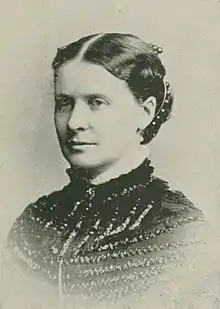Marietta Bones | |
|---|---|
 | |
| Born | Marietta Matilda Wilkins May 4, 1842 |
| Died | July 11, 1901 (aged 59) |
| Nationality | American |
| Occupation(s) | Suffragist, social reformer and philanthropist |
| Years active | 1881-1901 |
Marietta Bones (May 4, 1842 – July 11, 1901) was an American woman suffragist, social reformer, and philanthropist. In 1881 Bones was elected vice-president of the National Woman Suffrage Association (NWSA) and annually re-elected for nine years. In 1890 suffragist Susan B. Anthony and supporters of the movement merged the National Women Suffrage Association into the National American Women Suffrage Association (NAWSA).[1] In 1882, Bones made her first appearance as a public speaker in Webster, soon to be Webster, South Dakota, where she later resided. She was an active temperance worker, and was secretary of the first Non-Partisan National Woman's Christian Temperance Union in 1889. She took great interest in all reform and charitable institutions.[2]
Early years and education
Marietta Matilda Wilkins was born on a farm in Clarion County, Pennsylvania, May 4, 1842. Her father, James A. Wilkins, was born in Clarion County, where he resided for forty-eight years, prior to relocating to Iowa. He died six months later. Mr. Wilkins was a noted Abolitionist, known to have maintained an Underground Railroad station. Wilkins mother, Jane Trumbull, was originally from Connecticut, and a descendant of Jonathan Trumbull, better known by George Washington's pet name, "Brother Jonathan."[3]
Wilkins received her education from the Huidekoper Seminary, Meadville, Pennsylvania, and the Washington Female Seminary in Washington, Pennsylvania.[4]
Career
Marietta Matilda Wilkins took the name Marietta Bones after marriage. From 1881-1890 Bones was the vice-president of the National Women Suffrage Association. In representing the Dakota Territory, Bones worked with suffragists such as Susan B. Anthony and Linda Slaughter, who helped her expand membership in the vast territory.[5] In September, 1883 she addressed Dakota's State Constitutional Convention on behalf of woman's enfranchisement. Failing to have her claim for woman's equality before the law recognized in the State Constitution there framed, she earnestly petitioned both houses of Congress to deny Dakota's admission to the Union as a State. Bones actively opposed efforts to make the social question of temperance a political question by sharing her controversial views in newspaper articles.[4]
She was an active temperance worker and in 1889 was secretary of the first Non-Partisan National Woman's Christian Temperance Union convention in Chicago, Illinois. The local Woman's Christian Temperance Union (WCTU) in Webster, South Dakota discharged her after a year of service for her participation in the non-partisan convention. Bones received an official notice stating "The ladies of Webster union moved and carried that Bones' dues be returned on account of her having joined the secession movement, and also on account of her antagonism to our State president."[4]
As a pioneer settler in her town, Bones secured a donation of a block of lots for a courthouse and county buildings. Through her influence, Day County, SD was divided to provide a central location for the county-seat. Her actions to have the South Dakota state capital located at the geographical center, attracted the attention of the board of trade in the city of Pierre, SD. She was then invited to be an honored guest of their city. Bones was an able assistant of Matilda Joslyn Gage in organizing the Woman's National Liberal Union. She addressed the convention in Washington, D.C., and was one of the executive council of that organization.[4]
Personal life
In Iowa, she married Kendall Parker, and that marriage ended in divorce. She retained custody of their children, but did not receive any money in support. Secondly, she married Colonel Thomas Arthur Bones (1835–1923) in 1880 or 1881.[6] He was the president of the board of commissioners that built the Soldiers' Home at Hot Springs, South Dakota.[2]
She died July 11, 1901, in Washington, D.C. and was buried at Glenwood Cemetery in that city.
References
- ↑ "National American Woman Suffrage Association". History of U.S. Woman's Suffrage. 23 August 2016. Retrieved 2019-07-19.
- 1 2 Herringshaw 1904, p. 128.
- ↑ Willard & Livermore 1893, p. 104.
- 1 2 3 4 Willard & Livermore 1893, p. 105.
- ↑ Johnson 2010, p. 73.
- ↑ Johnson 2010, p. 71.
Attribution
 This article incorporates text from this source, which is in the public domain: Herringshaw, Thomas William (1904). Herringshaw's Encyclopedia of American Biography of the Nineteenth Century: Accurate and Succinct Biographies of Famous Men and Women in All Walks of Life who are Or Have Been the Acknowledged Leaders of Life and Thought of the United States Since Its Formation ... (Public domain ed.). American Publishers' Association.
This article incorporates text from this source, which is in the public domain: Herringshaw, Thomas William (1904). Herringshaw's Encyclopedia of American Biography of the Nineteenth Century: Accurate and Succinct Biographies of Famous Men and Women in All Walks of Life who are Or Have Been the Acknowledged Leaders of Life and Thought of the United States Since Its Formation ... (Public domain ed.). American Publishers' Association. This article incorporates text from this source, which is in the public domain: Willard, Frances Elizabeth; Livermore, Mary Ashton Rice (1893). "Julia McNair Wright". A Woman of the Century: Fourteen Hundred-seventy Biographical Sketches Accompanied by Portraits of Leading American Women in All Walks of Life (Public domain ed.). Moulton.
This article incorporates text from this source, which is in the public domain: Willard, Frances Elizabeth; Livermore, Mary Ashton Rice (1893). "Julia McNair Wright". A Woman of the Century: Fourteen Hundred-seventy Biographical Sketches Accompanied by Portraits of Leading American Women in All Walks of Life (Public domain ed.). Moulton.
Bibliography
- Johnson, Yvonne (1 February 2010). Feminist Frontiers: Women who Shaped the Midwest. Truman State University Press. ISBN 978-1-935503-02-6.